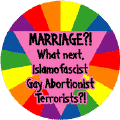
The Boston Globe Editorial, November 4, 2007
If language is a window on the world, a deliberate smudging of that window will make it harder to see the world clearly and comprehend it. So it is with the highly ideological term “Islamofascist,” a label that is being wielded as a blunt weapon in a left-right debate and has been carelessly bandied about by some presidential candidates.
Recently, the former leftist turned rightist David Horowitz promoted something called “Islamofascism Awareness Week” on college campuses. The implication was that the academic left has so lost its bearings that it can no longer recognize its historic enemy, the old fascist wolf, under that beast’s new disguise. Another apparent aim was to discredit scholars who insist on making careful distinctions among the various movements and ideologies that are grouped under the rubric of political Islam.
Transparent as the intentions of Horowitz may be, the Republican candidates’ use of “Islamofascism” is cruder still, and may cause considerably more harm. Just before he dropped out of the race for the Republican presidential nomination, Sen. Sam Brownback of Kansas spoke of a threat from Islamofascism during a visit to the Boston Globe. Rudy Giuliani – whose foreign policy adviser, Norman Podhoretz, just published a book touting World War IV against Islamofascism – commonly derides the Democrats because they “couldn’t even utter the word ‘Islamic terrorism.”’ And former Massachusetts governor Mitt Romney, while using the less obfuscatory term “radical Islamic jihadists,” has been striving to keep up with his competition by putting out a television ad titled “Jihad” and invoking what he calls “a military threat unlike anything we’ve known before.”
The next American president will need to have a lucid understanding of the threats facing this country. One of those threats undeniably comes from al-Qaida and like-minded groups. But the bands that swear allegiance to Osama bin Laden must be seen for what they are: stateless fanatics with a purist nostalgia for a seventh-century political and social order. Their primary goal is to overthrow regimes in the Muslim world they disdain as insufficiently Islamic.
Al-Qaida and company cannot be compared with the fascist powers ruled by Hitler, Mussolini, and Franco – neither for their ideas nor for their military power. The Nazis scorned religion, wanting to make the state the sole object of worship. Bin Laden and Hitler might share a proclivity for cruelty and killing, but for little else. Hitler cherished the operas of Wagner; bin Laden and his Taliban allies have been known to put musicians to the lash for playing music at a wedding. And bin Laden has no panzer divisions.
The intellectually lazy analogy of Islamism to fascism has another unwelcome effect. It obscures the significant differences that exist among disparate governments, movements and terrorist networks in the Muslim world. If all Islamists are carelessly labeled Islamofascists, it becomes practically impossible to distinguish the democratic, free-market, pro-European governing party of Turkey from the Taliban; or either of those Sunni parties from the Lebanese Shi’ite movement Hezbollah; or those three from Palestinian Hamas; or those four from al-Qaida.
Americans have already paid a terrible price for a president’s belated discovery that there were two sects of Muslims in Iraq: Sunni and Shi’ite. It is precisely because the security threats of the 21st century are so different from those of the last century that the next president must be free of tendentious simplifications such as Islamofascism.
Loose talk about Islamofascism or Islamic terrorism also carries noxious undertones. Such labels intimate that there is something inherently dangerous about all Muslims. And there is a subtext to those terms, an implication that the West faces an inevitable worldwide clash of religions and civilizations.
There need not be any such apocalyptic conflict. One way to prevent it is to give things their proper names – and not to allow the threat from bin Laden and similar fringe groups to be blown out of proportion by ideologues indulging in loose talk about a third or fourth World War.